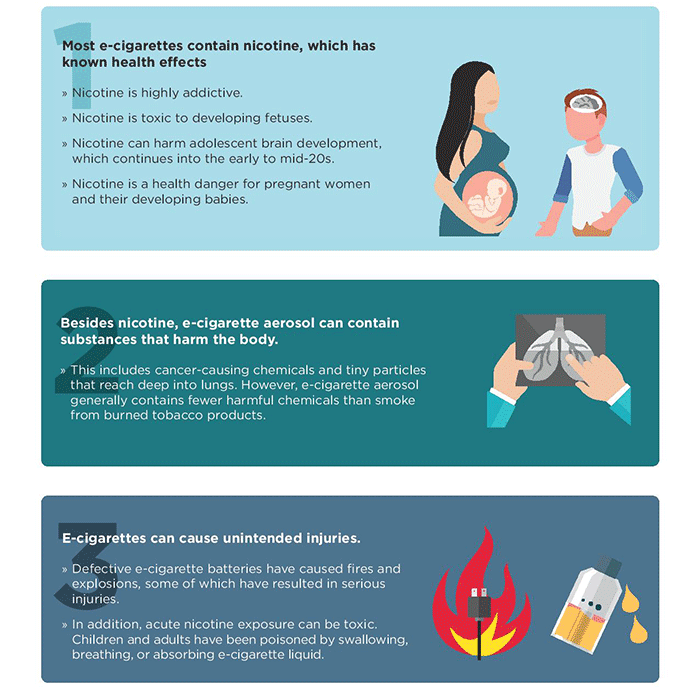Negative Health Impacts of Electronic Cigarettes
Electronic cigarettes (e-cigarettes), also known as vapes, are not harmless. While often marketed as a safer alternative to traditional cigarettes, they carry significant health risks and their use can lead to numerous adverse effects on the body.
Key Adverse Effects
Respiratory System Damage:

- The aerosol inhaled from e-cigarettes contains harmful substances, including fine particulate matter, volatile organic compounds, and heavy metals, that can irritate and damage lung tissue.
- Use is associated with increased airway inflammation, coughing, wheezing, and an exacerbation of conditions like asthma and chronic bronchitis.
- Some studies suggest a link to chronic lung diseases and a condition known as EVALI (e-cigarette or vaping product use-associated lung injury).
Cardiovascular Risks:
- Nicotine, a primary component in most e-cigarettes, is a potent stimulant that increases heart rate, constricts blood vessels, and raises blood pressure, thereby straining the cardiovascular system.
- Evidence suggests that e-cigarette use can contribute to endothelial dysfunction (damage to the inner lining of blood vessels), increase oxidative stress, and promote atherosclerosis, raising the risk of heart attacks, strokes, and other cardiovascular diseases.
Nicotine Addiction and Brain Development:
- E-cigarettes deliver nicotine, which is a highly addictive substance. The high concentrations of nicotine in some products can lead to rapid addiction.
- Adolescent and young adult brains are particularly vulnerable to nicotine’s detrimental effects. Exposure during these critical developmental periods can disrupt brain maturation, negatively impacting attention, learning, mood regulation, and impulse control.
- Early nicotine exposure can also prime the brain for addiction to other substances.
Exposure to Harmful Chemicals and Carcinogens:
- E-cigarette aerosol is not merely “water vapor.” It contains a complex mixture of potentially toxic substances beyond nicotine.
- These include carcinogens like formaldehyde and acetaldehyde, acrolein (a potent respiratory irritant), flavorants such as diacetyl (linked to “popcorn lung”), and heavy metals like nickel, tin, and lead leached from the device components.
- The long-term effects of inhaling these substances are still under investigation but are a significant health concern.
Risks During Pregnancy:
- Nicotine exposure during pregnancy, regardless of the source, is harmful to fetal development.
- It can lead to adverse pregnancy outcomes, including premature birth, low birth weight, stillbirth, and can negatively affect the development of the baby’s brain, lungs, and other organs.
- Pregnant individuals are strongly advised to avoid all nicotine products, including e-cigarettes.
Other Potential Dangers:
- Defective e-cigarette batteries can cause devices to overheat, catch fire, or explode, resulting in serious burns and injuries.
- Accidental ingestion or skin/eye exposure to e-liquids, especially by children, can cause acute nicotine poisoning, which can be severe and even fatal.
- Some evidence suggests that using e-cigarettes may increase susceptibility to respiratory infections.
In summary, despite perceptions of safety, e-cigarette use is associated with a range of significant negative health effects impacting multiple organ systems. The addictive nature of nicotine and the exposure to a variety of toxic chemicals underscore the public health concerns surrounding these products.










